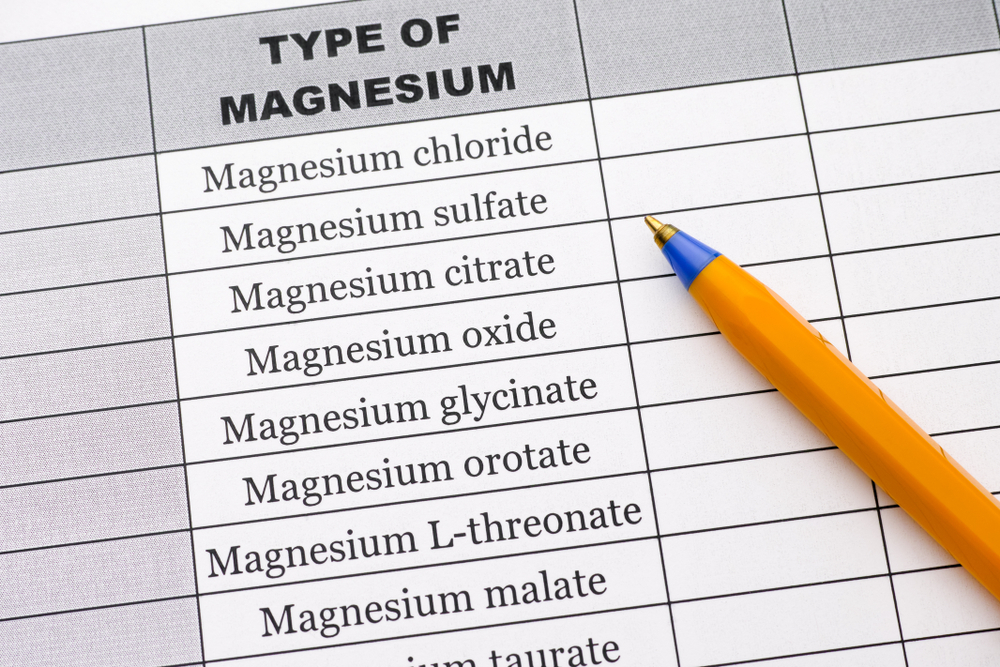Magnesium 101, FAQ, Types And Your Hormones


Magnesium is a mineral needed to help with a long list of functions including muscle and nerve movement, blood pressure, hormones and immune system. Unfortunately many Americans do not get enough magnesium. Because magnesium plays such an important role in overall health, it is important to understand why it is needed, the different types available, and how it affects your hormones. Here we offer a quick lesson on magnesium with a handy magnesium FAQ as your introduction to this important mineral. (1,2)
What Are The Types Of Magnesium?
There are several types of magnesium each with its own purpose and recommended use including: (3)
- Magnesium citrate
- Magnesium glycinate
- Magnesium chloride
- Magnesium lactate
- Magnesium malate
- Magnesium taurate
- Magnesium sulfate
- Magnesium oxide
You can choose the right type of magnesium to suit your needs. (3)
Magnesium FAQ
How Do I Know What Type Of Magnesium I Need?
You can use these guidelines to help you choose the right magnesium for your needs:
- Nutrition: If taking your magnesium as a dietary supplement look for products containing magnesium glycinate, magnesium lactate, magnesium malate and magnesium citrate. (3)
- Topical Use: When using magnesium on the skin, magnesium chloride and magnesium sulfate are often recommended. (3)
- Constipation, Indigestion and Heartburn: Magnesium citrate is often used by doctors to help relieve stomach issues like indigestion and heartburn, as well as for constipation. (4)
- Lower Blood Pressure and Support Cardiovascular System: There is limited evidence showing magnesium taurate could help reduce blood pressure as well as offer protection to the cardiovascular system. (5)
What Health Benefits Does Magnesium Offer?
Magnesium could assist with your health in a number of ways:
- Diabetes and Lower Blood Sugars: Magnesium rich diets could lower risk of type 2 diabetes as it can help control glucose as well as assist with insulin metabolism. (6,7)
- Thyroid function: Research shows severely low serum magnesium increases risk for hypothyroidism. (9)
- Anti-aging: Magnesium plays a key role in enhancing glutathione production. It also helps prevent telomere shortening while reducing oxidative stress which all help slow the aging process. (8)
How Does Magnesium Help With Sleep?
Magnesium is a nutrient that helps your body relax by reducing stress so you can sleep longer. When combined with melatonin you not only sleep longer, but also can fall asleep more easily. (10)
How Much Magnesium Do I Need?
Intake depends on your sex and age: (3)
- 19–30 years: 400 mg for males and 310 mg for females
- 31–50 years: 420 mg for males and 320 mg for females
- 51+ years: 420 mg for males and 320 mg for females
Is There A Type Of Magnesium That Is Generally Best?
Magnesium glycinate or bis-glycinate is easy to tolerate and very absorbable while also reducing the laxative effect other forms of magnesium can have. (8)
How Can I Increase My Magnesium Intake?
You can add the following foods to your diet: (3)
- Almonds
- Spinach and green leafy vegetables
- Roasted cashews
- Oil roasted peanuts and peanut butter
- Soy milk
- Cooked black beans
- Cooked edamame beans
- Peanut butter
- Whole wheat bread
- Avocado
- Potato with skin
- Cooked brown rice
- Low fat yogurt
- Fortified breakfast cereals
- Oatmeal
- Canned kidney beans
- Banana
How Do I Know If I Have A Magnesium Deficiency?
Symptoms of a magnesium deficiency include:
- Loss of appetite
- Nausea
- Vomiting
- Fatigue
- Feeling weak
- Muscle cramps
- Numbness and/or tingling
- Seizures
- Personality changes
- Heart rhythm changes and/or spasms
Magnesium And Hormones
Magnesium provides a boost to your hormones in many ways including:
- Estrogen: Magnesium deficiencies can interfere with how metabolites are made water-soluble allowing your body to excrete estrogen. This can result in high estrogen levels leading to issues like weight gain and increased risk for some cancers. (11)
- Steroid sex hormones: Magnesium allows you to produce steroid sex hormones including estrogen, progesterone and testosterone. (11)
- DHEA and human growth hormone: These anabolic hormones are produced when we sleep. With the help of magnesium, sleep improves, allowing us to produce the healing hormones that repair damage to our cells. (11)
- Serotonin: Magnesium aids in converting tryptophan into the hormone serotonin which improves mood. Serotonin is also required to make melatonin, which improves sleep.
- Cortisol levels: Magnesium can help maintain healthy cortisol levels by reducing excess production. It also helps relax the nervous system and assist in stopping uptake of cortisol into the brain. (8,11)
- Thyroid Hormones: Magnesium plays an active role in converting the less active T4 thyroid hormone to the more active T3 for improved thyroid health. (11)
Magnesium is an important mineral contributing to both your mental and physical health. For more information click here.
Sources:
- https://www.medicalnewstoday.com/articles/286839#_noHeaderPrefixedContent
- https://ods.od.nih.gov/factsheets/Magnesium-HealthProfessional/
- https://www.medicalnewstoday.com/articles/types-of-magnesium
- https://www.umcvc.org/health-library/d03797a1
- https://pubmed.ncbi.nlm.nih.gov/30963046/
- https://www.ncbi.nlm.nih.gov/pmc/articles/PMC4586582/
- https://www.ncbi.nlm.nih.gov/pmc/articles/PMC4549665/
- http://www.drkristinschnurr.com/blog/2016/1/10/magnesium-and-hormonal-balance-1
- https://www.ncbi.nlm.nih.gov/pmc/articles/PMC6028657/
- https://www.sleepfoundation.org/magnesium
- https://hormonesbalance.com/articles/boost-magnesium-levels-to-rebalance-your-hormones/









